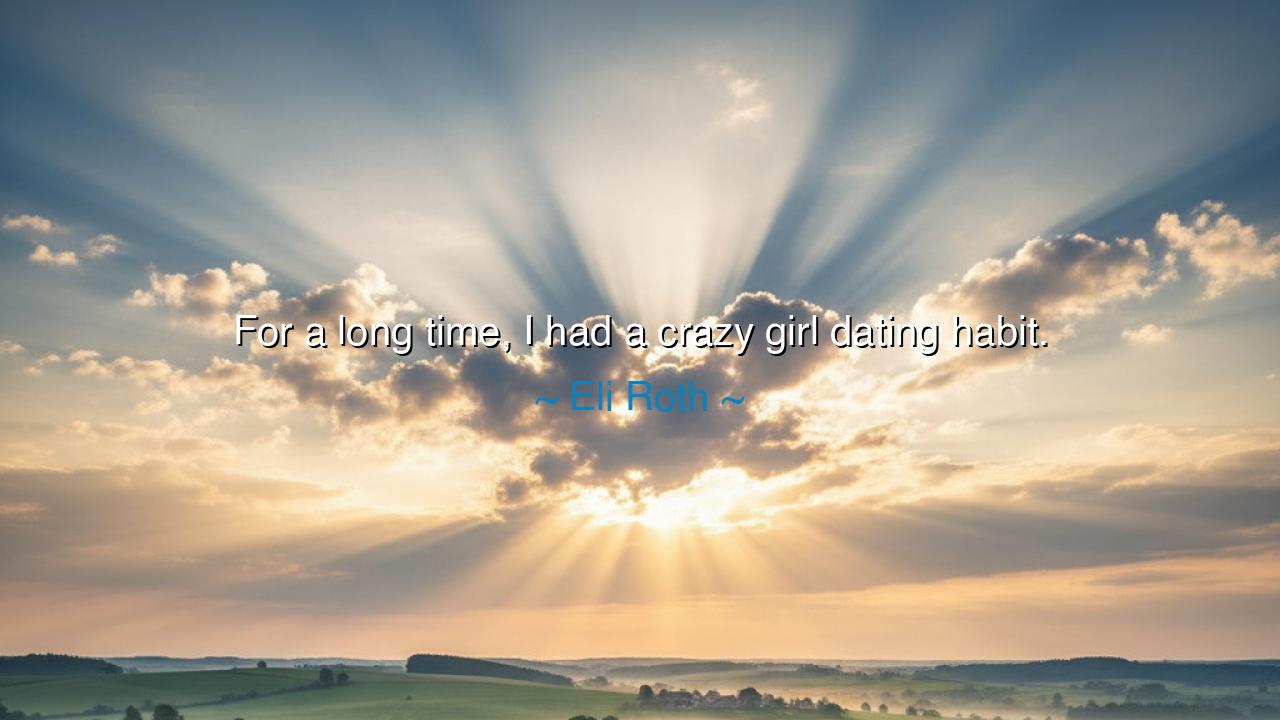
For a long time, I had a crazy girl dating habit.






The words of Eli Roth — “For a long time, I had a crazy girl dating habit.” — appear, at first glance, to be the simple confession of a man reflecting on his past mistakes. Yet beneath their humor and self-awareness lies a profound truth about the human heart: that we are often drawn, not to peace, but to chaos, mistaking its intensity for love. This confession, stripped of ornament, becomes a mirror for all who have loved unwisely — for those who have sought fire not for warmth, but for the thrill of being burned.
To say one had a “crazy girl dating habit” is to speak of a pattern of attraction not born of logic but of longing — a longing for passion, danger, or emotional storm. It is the recognition of a wound disguised as desire. In ancient times, the poets would have called such longing eros, a divine madness sent by the gods to test the mortal soul. The philosopher Plato warned that love, untempered by reason, becomes a fever that consumes rather than nourishes. And Eli Roth, in his own modern tongue, confesses to this fever — the endless chase of intensity over stability, of turbulence over tenderness.
There is something in every soul that hungers for the wild — for that which is unpredictable, electric, alive. But when this hunger goes unchecked, it becomes addiction. The man who seeks the “crazy girl” is not always seeking her; he is seeking the reflection of his own unhealed chaos. The storm he finds in her eyes is the same storm that brews within his spirit. Thus, what he calls “love” is often a mirror of his own unrest. Until he learns peace, he will forever dance with lightning, never resting long enough to feel the gentle warmth of the sun.
History itself offers a warning through the tale of Mark Antony and Cleopatra. Antony, the Roman general, powerful and disciplined, was undone by his love for Cleopatra, the queen of Egypt — brilliant, beautiful, and tempestuous. Their union burned with intensity but ended in ruin, as both were consumed by passion’s fire. Antony lost his empire, his honor, and at last his life. Like Roth’s confession, their story teaches that the flame which dazzles may also destroy. The “crazy girl,” or the chaotic love, becomes both muse and mirror — the siren who sings not to love, but to awaken what lies broken within.
The origin of such a habit is not born of evil or weakness, but of yearning. Many seek passion because they fear stillness; they crave validation through drama, believing that the louder the emotion, the deeper the connection. But the ancients taught that true love is not a tempest — it is a harbor. It steadies rather than sways, heals rather than haunts. To outgrow the madness of such habits, one must turn inward, confronting the root of what one seeks to escape. Only then can a person distinguish between love that burns and love that builds.
The lesson, therefore, is one of transformation: a call to break the cycle of emotional chaos and to seek peace not in another, but within oneself. As the Stoics would say, “He who conquers himself is mightier than he who conquers a city.” To overcome the “crazy habit” is to reclaim mastery over one’s heart — to understand that love is not meant to be a battlefield, but a sanctuary. It is not weakness to desire calm; it is wisdom.
So, let this teaching be your guide: do not chase intensity for its own sake. Seek instead a love that strengthens you — one that encourages growth, not turmoil. Before you choose a partner, ask: does this connection make me more myself, or less? Does it grant peace, or steal it? To know the answer is to step from illusion into clarity.
And if you have lived, as Eli Roth did, amid the chaos of emotional storms, do not despair. Every soul must walk through fire to learn its heat. The wise do not curse the flame — they learn to tend it. From such ashes, a new kind of love can rise: steady, luminous, and strong. Thus, the man who once confessed, “I had a crazy girl dating habit,” may one day say with peace, “I have learned to love without losing myself.” And that, dear listener, is the truest victory of all — the triumph of wisdom over passion, of calm over chaos, of heart over habit.






AAdministratorAdministrator
Welcome, honored guests. Please leave a comment, we will respond soon